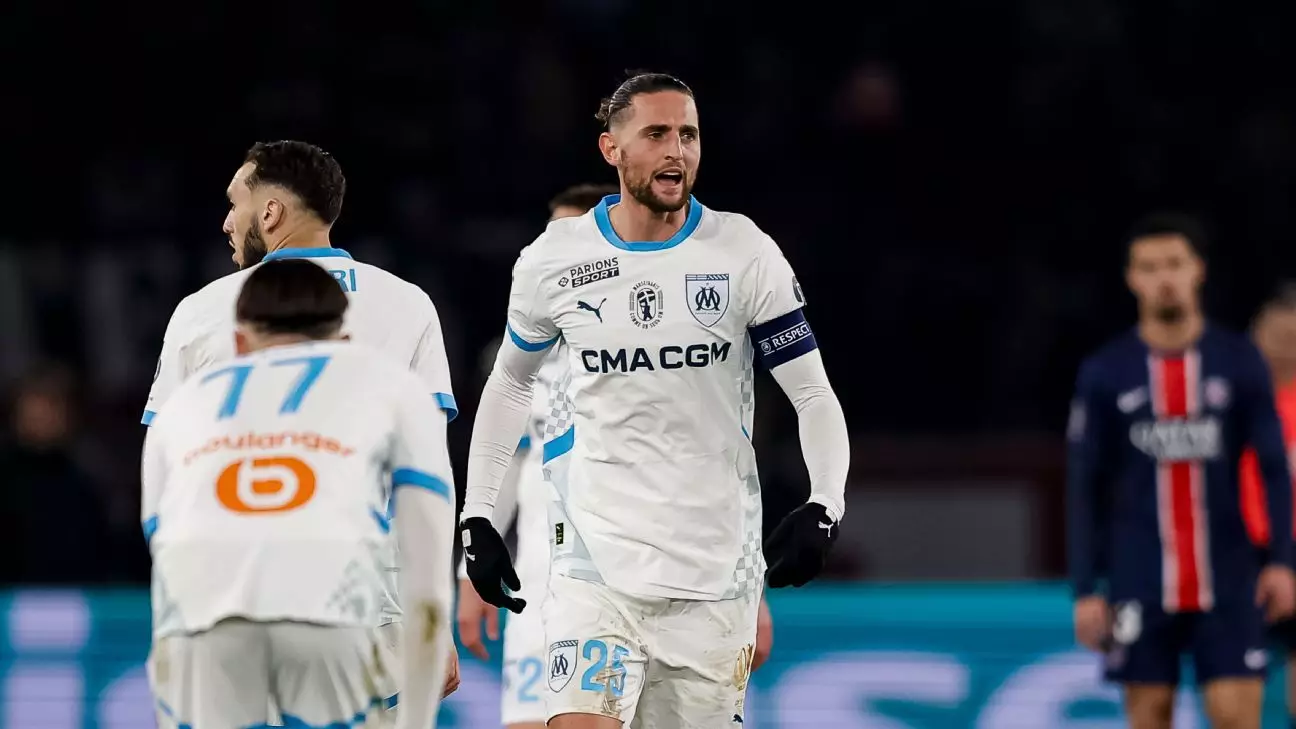In a world increasingly troubled by notions of entitlement and privilege, few events can highlight societal divisions more starkly than the recent clash between Paris Saint-Germain (PSG) and Olympique de Marseille. The Ligue 1 encounter, which ended with a 3-1 victory for PSG, transformed into a battleground of values when midfielder Adrien Rabiot, who once donned the PSG jersey for seven years, took to social media to denounce the behavior of his former club’s fans. Rabiot’s poignant reminder that “you can’t buy class” encapsulates a simmering tension that runs deeper than mere sports rivalry; it represents a clash between integrity and affluence.
Rabiot: A Personal Journey Through Adversity
Returning to face his former team is never easy, especially under hostile circumstances. Rabiot, who has emerged as a critical player for Marseille following his departure from Juventus, faced a torrent of vitriol from the stands. The chants directed at him became a cacophony of toxic verbal abuse, serving as a reminder that even in the arena of sport, hate and prejudice find their way into the most passionate of rivalries. Rabiot’s rebuttal—focusing on the disgrace of the insults hurled at him, including slurs about his family—highlights a personal struggle that goes beyond the football pitch. His mother, Véronique, who also manages his career, voiced her indignation on national radio, calling for accountability and questioning why such behavior continues to be tolerated in French football culture.
The Task of Governance: A Call for Action
The incident sparked a broader conversation about the responsibilities of governing bodies in the face of such rampant intolerance. French referees possess the authority to halt matches under the guise of discriminatory behavior; however, the leniency displayed during the match raises questions about selective enforcement. The fact that no action was taken during a clear exhibition of bigotry only serves to fuel a sense of impunity among offending fans. Organizations like Rouge Direct have begun to press for stricter measures against hateful expressions, demanding that government officials and football authorities take decisive steps to honor the sport’s integrity rather than dismissing such occurrences as mere ‘banter.’
The Lingering Impact of Banned Chants
Discriminatory chants have, unfortunately, become a trope of Ligue 1 matches, deeply entwined within the fabric of club identities. The offensive lyrics sung by PSG supporters, likening Marseille fans to “rats,” can be viewed as both an extension of football rivalry and a reflection of societal issues around race and community. In France, the derogatory use of the word “rat” has historically carried racial implications, particularly given Marseille’s diverse demographic. Fans’ inclination to resort to such language not only devalues the spirit of competition but also reinforces harmful stereotypes. This begs the question: when will the line be drawn between rivalrous banter and outright discrimination?
Moving Towards Change: Sports and Societal Responsibility
With football wielding considerable influence over public opinion, there lies a unique opportunity for leagues and clubs to champion social change. The consequences of neglecting this responsibility can be dire, as shown by the legal frameworks already in place prohibiting hate speech in public venues. The fines and potential imprisonment for public expressions of homophobia—measured yet insufficient penalties—reflect a broader struggle against the deeply ingrained misogyny and prejudices within sport. For Rabiot, and by extension all players who face harassment, the battle continues not only on the pitch but within the larger societal context as well.
While we voice our collective outrage at these incidents, it is essential to remember that change will not come from outrage alone. The normalization of bigoted behavior in football underscores a need for systemic transformations within both the sport and broader society. Rabiot’s bold stand against fandom’s toxicity may serve as a turning point in challenging the status quo. While football fans may cheer for their teams, it’s of utmost importance that they do so without compromising respect, dignity, and—most importantly—class.


Leave a Reply